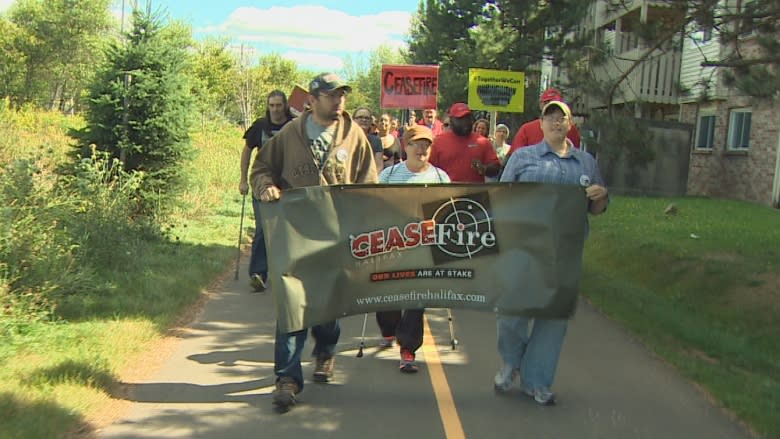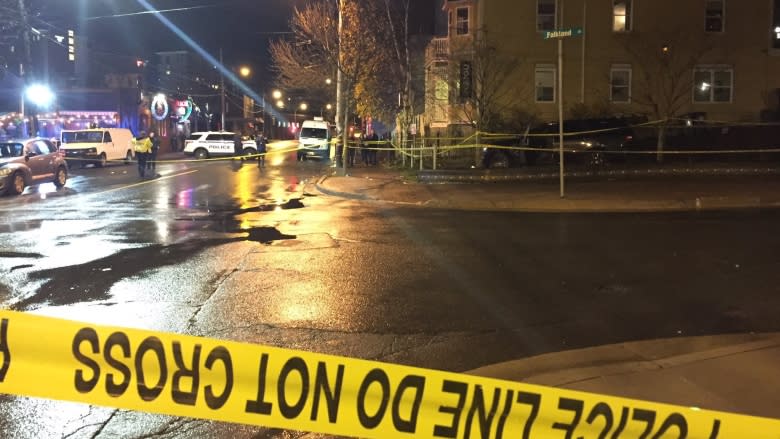CeaseFire Halifax hopes city continues funding set to expire this month
A community group that works to prevent violence in the Halifax area is pushing for city council to continue its soon-to-expire funding.
However, a staff report on CeaseFire Halifax recommends against funding the $2.34-million program, and instead recommends that components of the program be rolled into existing city youth programs.
Mel Lucas, the program manager for CeaseFire Halifax, helped present the case for funding to the city's police commission in December. At that time, the board asked for the staff report to go to city council.
Lucas said he thinks CeaseFire's credibility and effectiveness with its clients would be lowered if it was integrated into city youth programs.
Building trust
"One of the reasons that we are able to maintain a level of credibility with the individuals we connect with is because we don't, and they know we don't, communicate with the police," he said.
"Government is one of those dirty words to a lot of people, especially, many of the high-risk folk who connect with [us] because they don't trust police. They don't trust government. That's one of the reasons we are able to operate as we are, because we are a non-profit organization."
Lucas said he's concerned an affiliation under any specific municipal government program would "push away" the very individuals CeaseFire works to attract.
CeaseFire works with young men between 16 and 24, who are at risk of being involved in gang violence. Its 11 workers are a mix of Outreach Workers and "violence interrupters." They work within their communities to build trust one-on-one and convince clients to use alternatives to violence.
"Violence is contagious and it spreads from one person to another. And really, it's this violence that's making our community sick. We look at the solution as being, well, we try to make the most violent communities safer and healthier," explained Lucas.
Funding ends March 31
CeaseFire concentrates on the communities of North Preston, East Preston, North Dartmouth, Mulgrave Park and Uniacke Square, and has a particular focus on helping young men and black youth.
The funding to bring the program to Halifax began in 2013 and came from federal and provincial sources. That funding is set to end on Mar. 31. The organization is now seeking funding from the municipal and provincial governments.
CeaseFire presented a range of funding options, from $2.34 million to continue its existing programming, up to $3.57 million to allow it to expand and enhance its program for the highest-risk clients. These options would see CeaseFire through until March 2021.
In the report to councillors, staff noted that much of CeaseFire's work aligns with Halifax's own public safety strategy in terms of the areas and population it serves.
The report also noted that 70 per cent of CeaseFire's clients had a prior criminal history, and 45 per cent of those people had recently been released from prison. As of December 2017, CeaseFire had worked with 120 clients.
However, the staff report analyzed violent crime and gun violence in the city since the time CeaseFire began operating. It found there was a downward trend, but could not point to direct evidence linking the decline to CeaseFire's work.
Effectiveness questioned
"In summary, there is little evidence that CeaseFire Halifax generated positive results in relation to key Priority Objectives," the report concluded.
"It is crucial to underscore, however, that this does not suggest CeaseFire Halifax was ineffective, but rather that there is a lack of evidence demonstrating its effectiveness."
For those reasons, staff recommended the approach that would adopt some of CeaseFire's techniques, instead of providing funding.
Lucas said he thinks much of the work done by CeaseFire is not reflected in the statistics covered in the staff report. He noted the organization's goal is violence prevention.
'You don't find those type of things in statistics'
"Where many times there's something that goes crazy, you've got people running in the opposite direction, our staff actually go towards the conflict and the intent, of course, is to de-escalate whatever situation might be going on," he said.
Lucas said the organization has conducted more than 200 mediations, and between 60 and 70 per cent of those conflicts have involved individuals carrying weapons of some type.
"The person that they're speaking to calms down enough that they put that weapon away. There are many little things that are not recorded anywhere. You don't find those type of things in statistics," he said.
Halifax city council will debate the staff report on Tuesday.



